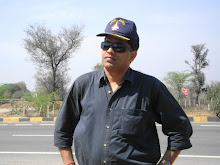Posting an old blog .... (January 28, 2009)
As the Indian Republic enters the 60th year, it’s perhaps time to take stock of what ails our polity. And the answer could well be- a crisis of consensus.
Nation-building is a continuous process and requires a consensus among those in power and those in waiting. But sadly, this has rarely been seen in India, preventing the country from realising its actual potential.
Opposition for the sake of opposition negates its very role in a vibrant democracy. It’s indeed an irony that within a modern political system that gives a level playing field to all, our leaders lack the maturity and look at national issues though the prism of partisan politics and electoral compulsions rather than judging them on merit.
Let’s take a couple of examples. Over several years, each terror strike has led to a raging debate on measures to tackle the menace. But instead of sitting together to put up a united front against terror, leaders have always indulged in political blame game.
The outcry of citizens against the entire political class after the Mumbai terror attacks, was perhaps long overdue. In that sense, many thought the Mumbai attacks and the protests thereafter could be an eye-opener for the political leaders.
But that was not to be! The all-party meet convened by the UPA government was given a miss by BJP’s prime ministerial candidate L K Advani and party president Rajnath Singh. This was surprising considering that the main opposition party had been demanding anti-terror laws, accusing the UPA of being soft on terror.
Finally, Parliament passed the bills setting up a National Investigation Agency and approving amendments to the Unlawful Activities (Prevention) Act. But soon political discord was visible at conference of the chief ministers on terror. As expected, differences cropped up with BJP-ruled states voicing reservations against NIA, saying it dilutes the federal character of the polity.
In short, a consensus on anti-terror measures still eludes us as a nation and it is unlikely that it can ever be achieved.
The next best example is perhaps the Indo-US nuclear deal. The debate on it had more to do with partisan politics rather than the merits or demerits of the deal.
Parties opposed to the deal – ironically from both extremes of the political spectrum (the BJP and Left) – found new ammunition when days before India finally secured the NSG waiver, the US media leaked some communication from the US Congress to the State Department. It said how the communication was kept under wraps to shield Prime Minister Manmohan Singh from political opposition back home.
Both the BJP and the Left parties latched on to it, accusing Manmohan Singh of lying to the nation and calling for a privilege motion against the prime minister in Parliament. It was the same story earlier before the draft of the nuclear deal was cleared by the International Atomic Energy Agency (IAEA). The main bone of contention is the ‘testing’ clause and fuel supply guarantees and Singh was, time and again, blamed of lying in Parliament on the issue.
On his part, Singh had made it clear in Parliament that India retains the sovereign right to test. The fact that consequences will follow if India were to test including sanctions and perhaps the death of the deal are too obvious. Deal or no deal, the consequences for testing would be the same for India. After all New Delhi had been facing the technology denial regime since the first explosion in Pokhran in 1974.
A day after the NSG waiver, Brajesh Mishra, National Security Advisor in the Atal Bihari Vajpayee government, said as much, something diametrically opposed to the BJP’s stand.
If not anything else, the BJP should have taken half credit for the deal. The deal’s foundation was, in fact, laid during the Vajpayee regime when the then External Affairs Minister Jaswant Singh held marathon talks with Strobe Talbott after the heat of Pokhran-II subsided. The BJP’s subsequent opposition to the deal stemmed more from its current political space that it occupies rather than any sound rationale.
As regards the Left parties, their opposition to the deal was perceived to be rooted in ideology-unable to see India as a strategic ally of the US- rather than the deal per se.
Whether the deal is good or bad for the country is debatable. But unfortunately, the political debate on it could not come out of the fold of party politics.
As India aspires to play an increasingly important role on the global stage, it’s imperative that parties shed their narrow political agenda and think in terms of a national agenda that cuts across party lines.
By retaining Defence Secretary Robert Gates, Barack Obama has shown the way that in the ultimate analysis party politics should be subservient to national interest. We need to emulate that model to take the country to the next level – the high table of global leadership.




How can you add-lib on a crisis, overlooking the one at your doorstep?
ReplyDelete